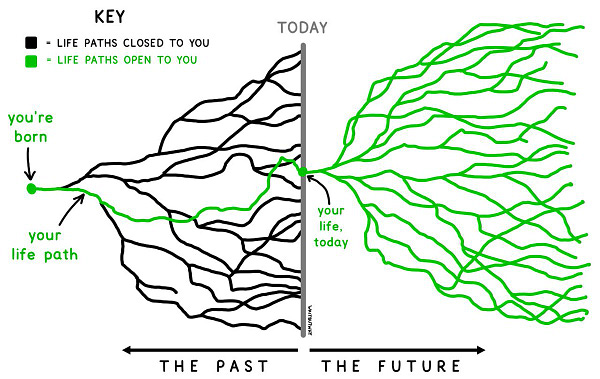How to stop being your own worst enemy
5 steps for overcoming self-sabotage and defeating the 'resistance'
There's a concept in the creative world—known to most writers, artists, and entertainers—as the resistance.
The resistance is, in short, the thing that holds us back. It's the voice in our heads that says "you can't do this."
The concept was brought into the common vernacular by Steven Pressfield in The War of Art, his 1992 ode to creativity that has inspired generations of creators to conquer their inner demons.
Pressfield describes the resistance like this:
"Most of us live two lives. The life we live, and the unlived life within us. Between the two stands the resistance."
The concept of the resistance is an important one for creators, but it's just as applicable for business builders, athletes, and even parents.
The resistance takes many forms:
Procrastination
Imposter syndrome
Fear
Anxiety
Blaming our circumstances (age, wealth, geography, education, time)
Unnecessarily damaging our relationships
Alcohol, drugs, and other forms of self-sabotage
Distractions - including social media
Rationalizing sub-standard relationships, fitness levels, or quality of work
Author Seth Godin, who has in many ways picked up the 'resistance baton' from Pressfield, delves into the concept in his book Linchpin, and explains it this way:
"Are you in the wrong industry? Does your spouse hold you back? Is it the economy? Perhaps it’s the vendetta your boss has always had against you. The resistance is working overtime to be sure that you won’t actually do anything remarkable."
In other words, we are our own worst enemies when it comes to achieving anything great.
There's an evolutionary reason why this tendency toward self-sabotage exists within us. Ten thousand years ago, delusions of grandeur tended to get folks like you and me killed. Change equaled danger. And our pre-historic "lizard brain" —to which many of our behaviors are still beholden—was wired to do one thing: keep us alive.
So it is our natural instinct not to step out of the pack. We are wired to behave how others expect us to behave—to avoid doing anything out of character or outside of what would be considered 'normal.'
The resistance is strong. Very strong. So strong in fact that most of us ultimately succumb to it. It’s never a conscious decision but rather 10,000 small ones.
Okay, I’ll take less money. Okay, I won’t start the business. Okay, I won’t speak up in the meeting.
And through these 10,000 compromises, the resistance wins. Steven Pressfield describes this safe, acceptable route as our 'Ego.' Our lizard brain needs to protect the Ego—and the status quo—at all costs. All unnecessary risks are to be avoided.
It becomes a self-fulfilling prophecy. And for the vast majority of us, that’s actually kind of okay. We can still lead happy, fulfilling lives. We can have strong relationships. We can raise great kids. We can have careers that anyone would be proud of.
But...
That doesn't mean it isn't sad—heart-breaking, in fact—to know that there could have been more. Forget about money or fame or any of those material trappings. There could have been more fulfillment. More exhilaration. More certainty that we are on the right path, doing exactly what we are 'meant' to be doing, and doing it to the absolute best of our capabilities.
Secretly, we know we can do better. We don't think we're living up to our true potential. We could have been far more successful—professionally, athletically, in our relationships—whatever it is. We could have been more.
"Wow. That is depressing, Greg. You are absolutely not going to be on the preferred dinner guestlist in the post-COVID world," you might think.
But wait.
I have good news.
We're not dead yet.
We still have time. Even if you're reading this and you're in your (pick your age group— 30s, 40s, 50s, 60s, 70s, 80s), it doesn't matter. You still have time.
What we are really good at forgetting is that history is not destiny.
Wait But Why author, Tim Urban recently shared the graphic below on Twitter, which makes this point perfectly. We are so focused on the past—on those other paths we could have, should have, or would have taken—that we completely forget the wide-open canvas that lies in front of us.
Our history is not pre-written. Will it be influenced by where we have been to-date? Of course. But pre-determined? Absolutely not.
So, what should we do about this? Because you know I'm not letting you out of this article without a checklist.
Acknowledge the resistance. This sounds simple. But it's powerful. When you realize that you are quite literally wired to avoid change—and, in fact, to discourage others from changing—the world begins to open up. You feel better about yourself. You understand what you're battling, and maybe what you're doing to others. And ironically, it's the first step toward change.
Uncover the identity you wish to embody. We all have something inside of us that we think we are capable of but have yet to do. What is that for you? The danger here is not in thinking too big, but rather in thinking too small. Remember when I wrote about 10x improvements vs. 10% improvements? This is what I'm talking about here. Give yourself permission to think ridiculously big.
Reverse engineer it & make a plan. Who has already done what you want to do? Study them. Or just picture yourself as the person with the fulfilling career, or the meaningful relationship, or the fitness level 10x where you're at today. What do that person's daily habits look like? Make those your habits. I wrote about this here and here.
Do the work. We've talked about manufacturing passion and how the real joy is the journey, not the destination. There's a reason why Pressfield's follow-up book to the War of Art is called Do The Work. This is the step where the magic is. Not in thinking about it, or talking about it, or reading about it. But rather in doing it. In getting the reps. To quote the Jedi master, Yoda, "Do or do not. There is no try."
Publicize it. There is something about announcing your ambitions to the world. I told you how when I was writing my first book I didn't even really believe it myself until I told others about it. As soon as you tell someone—I'm starting my own business. I'm writing a book. I'm losing 50 lbs.—you are on the clock. Accountable.
So there you have it. The resistance.
Now I’ve got some thinking to do about how it’s slowing me down. How about you?
Have a great week.
Greg
Photo credit: Sasha Freemind @ Unsplash.com
Extra credit: I highly recommend anything Steven Pressfield has written from The War of Art to The Legend of Bagger Vance (I prefer the book over the movie). My article today is most immediately inspired by this great interview that Pressfield just did with Tim Ferriss. Well worth the listen.
Thanks for reading.





